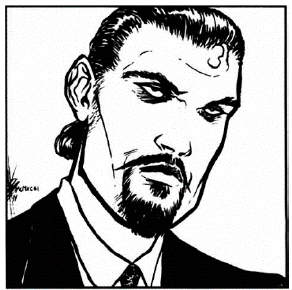Luis Miguel de Mendoza
The Archbishop of Miami was born in 1720 into a minor aristocratic family from Burgos, rich in prestige but little else. As a young Franciscan missionary, he traveled to New Spain to spread the Catholic faith and bring “civilisation” to the native “savages.” He soon learned that his colleagues in the colonies were less interested in saving souls than they were in misappropriating colonial funds and exploiting forced indigenous labor. Desperate to make his fortune whatever the cost, he came to mute his conscience.
As a novice priest, Luis Miguel traveled across Cuba and elsewhere in the Spanish West Indies,
moving from mission to mission. His career started to advance after he wrote a series of zealous
treatises claiming that the “barbaric” practices of the native populations justified Spain conducting holy war against them. In private, however, he became a deeply cynical atheist, convinced that religion was a superstition and a swindle. Belief, he admitted, was useful for motivating men, securing their money, and for legitimating shameless scrambles for loot. There were some sensitive souls in the clergy who protested the treatment of the indigenous Americans, who were consistent in their professed principles of love and compassion, but they could not stop the wheels of imperialism. Conquest and colonisation were lucrative enterprises, and Luis Miguel had no qualms in benefitting.
In time, he was recruited by a Lasombra elder, a former conquistador from the campaigns against the Aztec Empire. From within the Church in colonial Mexico, Luis Miguel passed secret information about his holy brothers to his sire, enabling their blackmail. He also developed links to the northern frontiers, where the Spanish missions were most active, expanding the clan's network of contacts. After many years of service, he was Embraced in 1762 and put through the Creation Rites, joining the coven of his sire in Veracruz on the Gulf of Mexico. The city was a Lasombra stronghold due to its importance as a major Atlantic port. At the time, La Sociedad controlled a sizable portion of the sugar and rum industries that enabled Luis Miguel to set aside material concerns. He decided to revisit his faith, now that he was one of the Damned. His humanity dwindling, he needed purpose.
After experimenting with several paths of enlightenment, Luis Miguel joined the Cathari in their
pursuits of sin and depravity. His cynical view of the Church and religion at large became an
excuse to engage in the most lewd and profane acts to demonstrate his contempt for humanity and its morality. He would dress regularly in his clerical robes and oversee blood orgies in the lavish halls of the powerful elite. In an act of intentional hypocrisy, he kept his induence centered in the local Church, its priests his pawns. Little did his retainers know their benefactor presided over nightly rituals that denounced God and Christ.
After independence, Mexico grew increasingly polarized between the liberal urban bourgeoisie and the mostly conservative clergy, military, and peasantry. Thanks to his connections and the status of La Sociedad, Luis Miguel weathered several mortal uprisings. Like many of his clan, he refused to turn his back on his networks in the Church, even as anti-clericalism became more mainstream.
In the chaos of the Mexican Revolution (1910- 1920), his luck ran out; many of his long-term
partners and associates betrayed him or died. When his sire met a sunrise in 192?, Luis Miguel
decided it was time to relocate. He briefly considered California and Texas before deciding that he would try his luck in South Florida with the land boom happening there.
The Camarilla already had its agents in the region, but when the Great Depression shook the U.S. economy and the land bubble popped, Luis Miguel and La Sociedad united with other covens to turn the economic ruin and social unrest to the Sabbat's advantage.
The 19th century wars of independence in Latin America and civil war in Mexico also drove many
Sabbat packs northward, and Luis Miguel found no shortage of allies (and rivals) in fighting for
sect ownership of the city. His peers mostly underestimated him as a decadent wastrel, to their
peril. It was no accident that he survived decades of brutal conflict with the Camarilla and the
equally brutal nature of Sabbat politics, becoming Miami's longest continuous holder of a bishop
title. Not a warlike personality, he was never considered a candidate for the position of Archbishop if it was in a state of siege. When Fabricia Conterac finally secured Miami and launched her series of shock victories across the Southeast U.S., Luis Miguel smiled from the sidelines, began calling in boons and favors, and bided his time.
As he predicted, Conteraz was soon promoted to the rank of Cardinal and tasked with leading
crusades full-time. In the resultant power vacuum, Luis Miguel emerged as Conteraz's successor, a consensus compromise candidate instead of anyone's enthusiastic choice. Since his rise in the
mid-2000s, however, he has become accepted if only for his penchant for sadistic, sacrilegious excess and his initial laissez-faire attitude toward exercising his authority over the city's covens. This style of rule aligned nicely with the carefree, self-indulgent attitude among the Miami Sabbat after their hard-fought triumphs at the turn of the millennium, and so Luis Miguel's
opposition started to soften.
Every Sunday night at midnight Luis Miguel conducts a “Black Mass” to which all Sabbat vampires are welcome. He heaps praise upon the vices of humanity, each week celebrating one deadly sin. Naturally, be eschews bloviating sermons for highly stimulating representations: legendary orgies dedicated to lust, gladiatorial tournaments with kidnapped mortals in honor of wrath, and so on.
Even those Sabbat who do not walk the Cathari road can rely on at least a mildly entertaining time, a few become slaves to their base desires and disciples of the Archbishop. To catch the attention and receive an education from Luis Miguel is considered a coveted mark of distinction for all Albigensians.
Modern nights find Luis Miguel still secure in power, but be now takes a more autocratic approach to governing. He depends on the support of Bishops Palacios and Rodriguez, clients to his patronage. Often, he can also barter for the backing of Herivaux and the Black Pearl when
necessary. He finds both the dour Ultraconservatives and the Loyalist rabble more irritating than serious threats, at least for now. He is unwilling to give up his extravagant lifestyle and leaves the more serious matters to his “packmates,” who grow increasingly concerned their master is spiraling dangerously close to becoming lost in his lechery.
Physical Description
General Physical Condition
Luis Miguel de Mendoza has a beautiful and noble bearing, with smooth olive skin and soft brown eyes. His long, luscious black hair is usually in a ponytail. He has a captivating presence and effortless charisma; he exudes the aura of someone who has lived a fascinating life. He prefers loose casual (but still designer) clothes to suits and formal attire. When he presides over his “Black Mass” he wears black bishop's robes adorned with the symbols of the Sabbat and Caine. He speaks English fluently and without an accent, although he can switch to romantic poetry in perfect early modern Castilian without missing a beat.

Character Breakdown
- Sire: Don Francisco Javier Moreira
- Nature: Bon Vivant
- Demeanor: Gallant Generation
- Generation: 7th
- Willpower: 9
- Morality: Path of Cathari 7
Species
Life
1720
1762
42 years old
Children
Aligned Organization
Other Affiliations
Ruled Locations



Comments